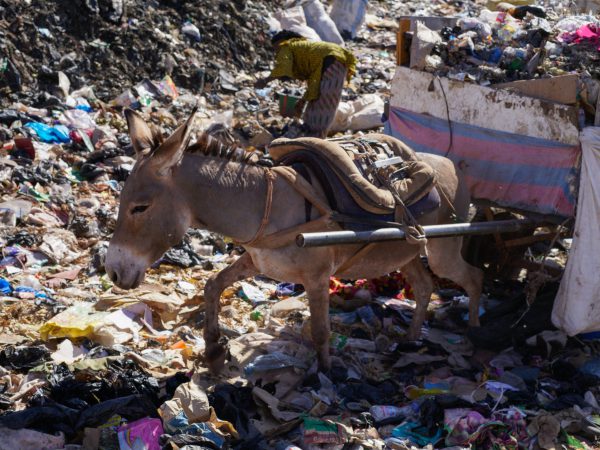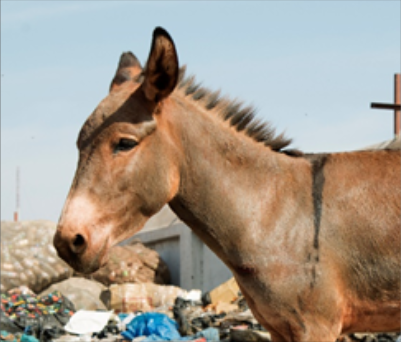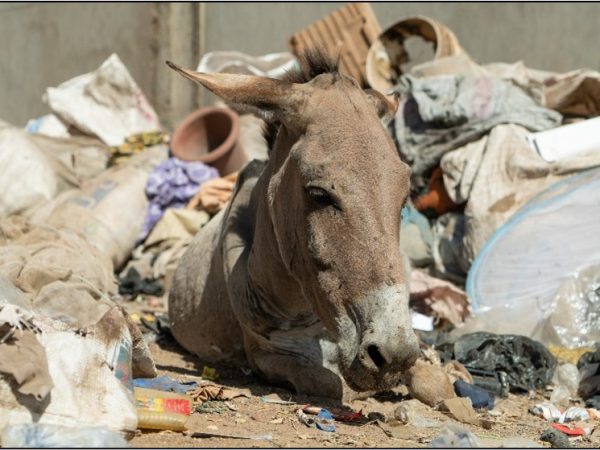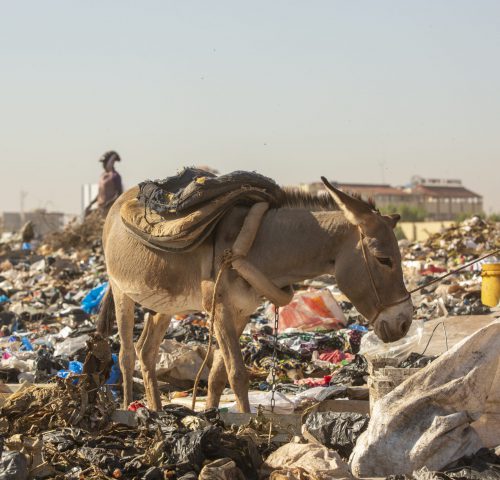
A simple vaccine could save working animals from this horrific disease.
Working animals worldwide are at risk of tetanus, a debilitating and often fatal disease, when they carry out their important work. If not treated immediately, tetanus can cause an agonising death.
Animals working in dangerous and dirty areas, such as cities and rubbish dumps, are surrounded by threats on a daily basis. All it takes is a graze from a collision on a busy street or a small cut from a sharp object for bacteria to enter an animal’s bloodstream and cause a catastrophic decline.
Yet all they need is a simple vaccine to protect them.
With the help of kind supporters like you, we can save innocent animals from this preventable disease.

Fleur’s story
Fleur the two-year-old donkey transports waste from Bamako, Mali’s capital city, to the rubbish dump in Badalabougou. On the busy streets, she already risks her life dodging traffic while pulling a heavy rubbish cart.
This hard and dangerous work supports her owner, Ali, and his four children.
At the dump, there is even more risk. Lurking in the piles of rubbish, metal and soil are sinister bacteria that cause tetanus. The bacteria need only a tiny break in the skin to get into Fleur’s thin body and flood her nervous system with toxins.
It’s hard for Fleur to balance on the mountains of rubbish as she pulls her heavy cart. As she tried to steady herself one day, Fleur stepped on a nail sticking up from discarded wood, piercing the soft part of her foot.
Blood oozed out of Fleur’s foot as she limped. It was a small wound, but deep and excruciating – the perfect entrance to the body tetanus bacteria needs to cause catastrophic problems.
Limping through ankle-deep waste, the cart Fleur pulled felt heavier and heavier as she grew weaker from the pain. Every step stung and put Fleur at increased risk of tetanus. She needed urgent help before her deep wound became infected and put her life in danger.
Luckily, Ali had seen the SPANA mobile clinic, which visits the rubbish dump weekly, and he brought her there to get help.
Our vets got to work cleaning and disinfecting Fleur’s wound. They gave her anti-inflammatory medication to reduce the painful swelling. Crucially, they also gave Fleur a preventative and lifesaving anti-tetanus vaccination to stop the lethal infection before it could take over her body.
Ali was so grateful for the treatment Fleur received.
“Fleur is very important to me,” he said. “Thanks to Fleur, I can feed my children. I thank SPANA who are doing good work.”

This horrific disease can be prevented through a simple solution – vaccination.
The tetanus vaccine is not available in any of the countries where we work, so SPANA’s vaccination programme is vital. We have vaccinated thousands of working animals over the years, but many more are still at risk. Only with your help can we keep our mobile clinics stocked with lifesaving tetanus vaccines to save animals from the agony of this awful disease.
Without vaccination, it’s often too late to save other working animals from a horrific death once they become infected with the deadly tetanus bacteria. In their hazardous workplaces, whether it’s carting heavy building materials to remote villages or carrying water around treacherous roads, tetanus bacteria are waiting for the slightest injury. Without intervention, tetanus will take the lives of more working animals.
Our teams are committed to reaching as many working animals as possible with lifesaving vaccinations and treatment. With your help, we will protect working animals from deadly but preventable tetanus and save the lives of more hardworking animals.


